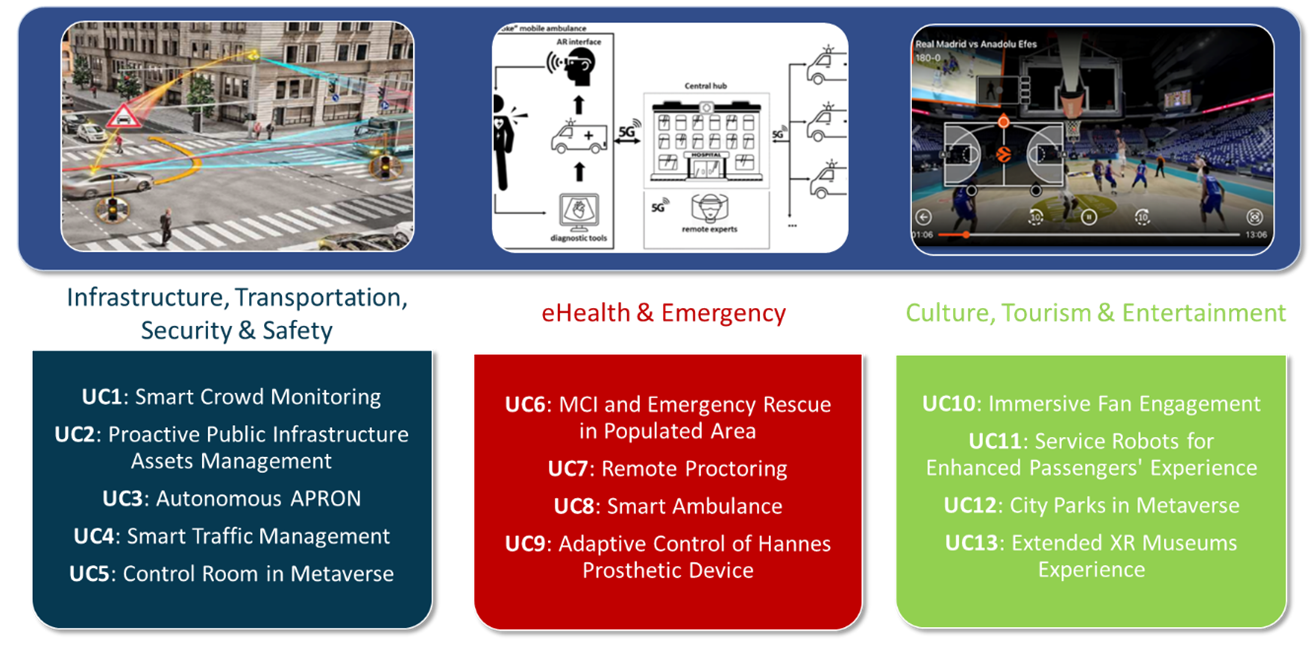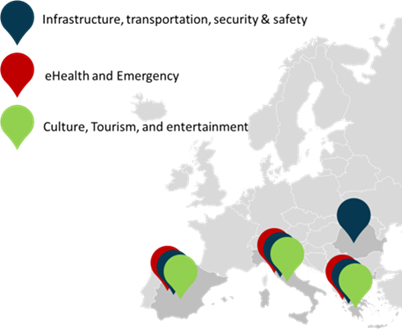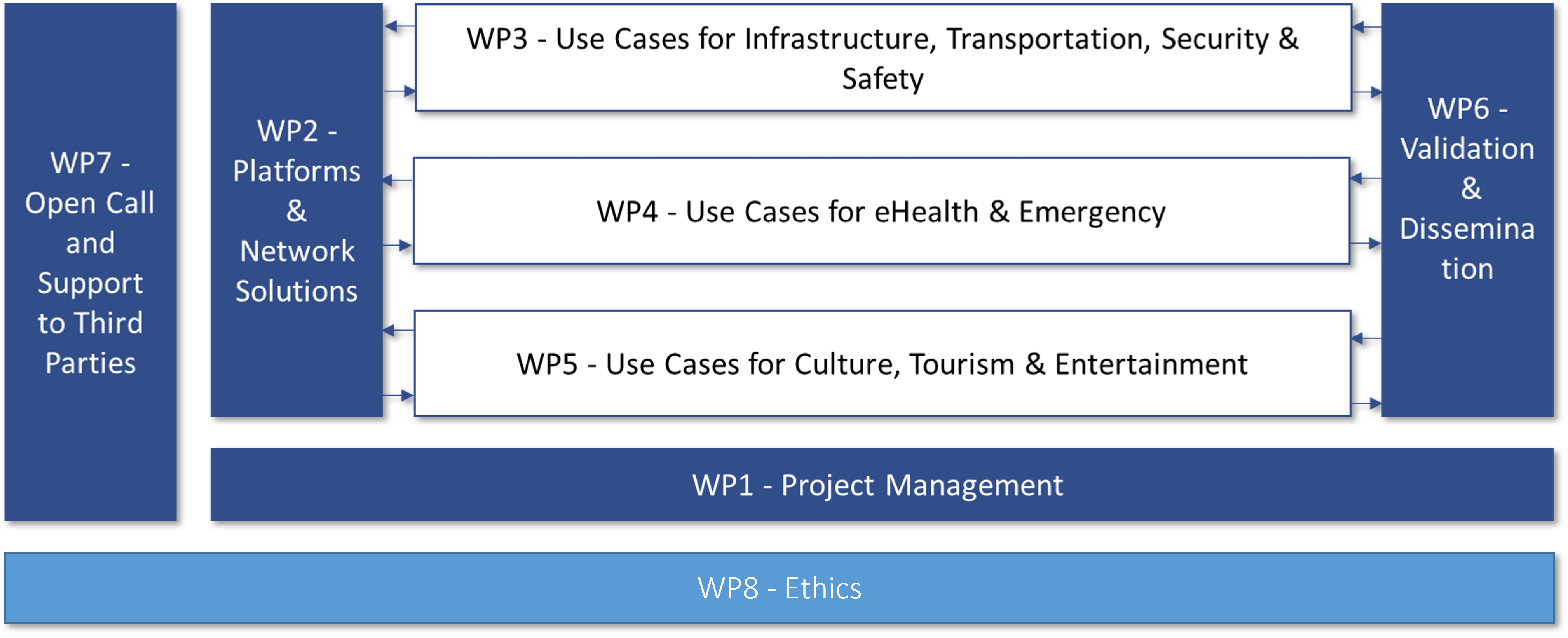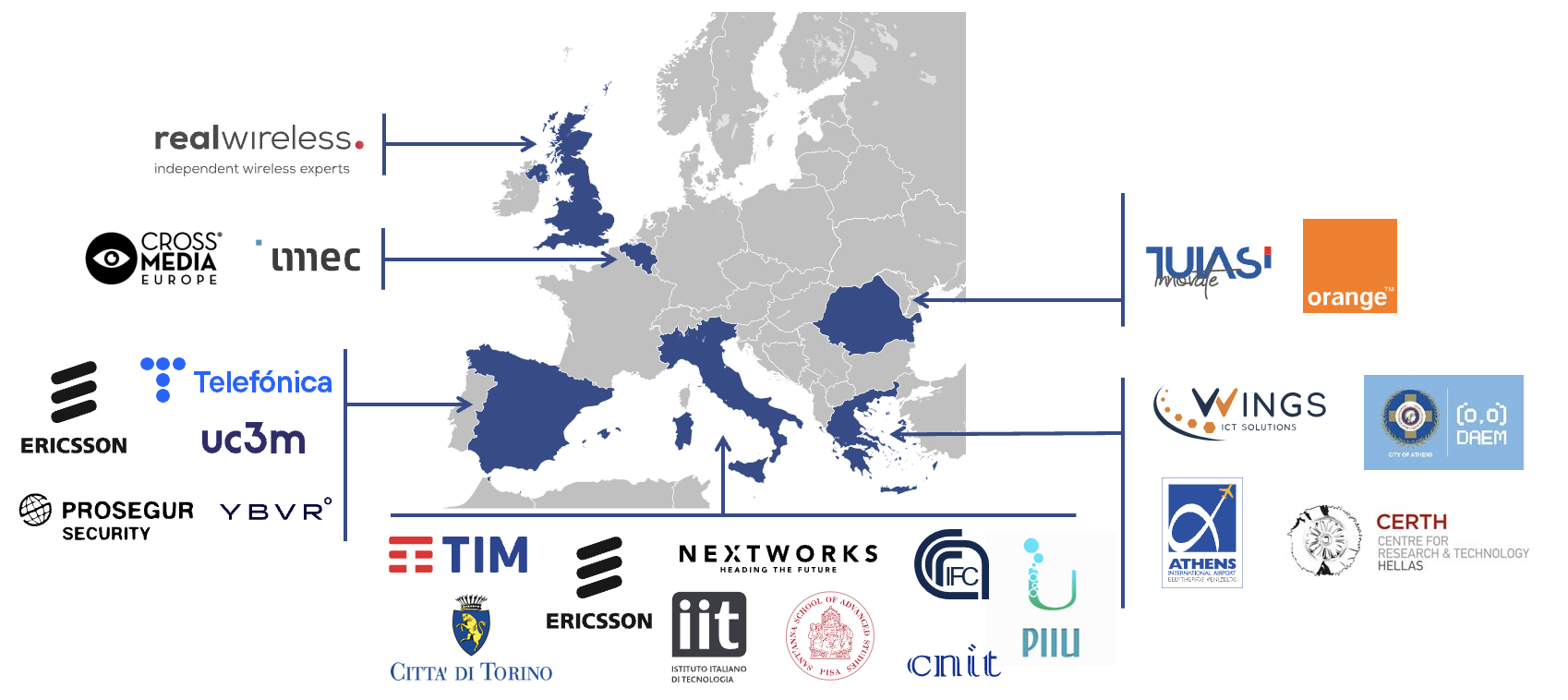About the TrialsNet project
Overview
TrialsNet will target a set of technical, performance and productivity objectives which will impact the current 5G ecosystem substantially, effectively leading the B5G technology wave that is expected to take place during the project lifetime and drawing compelling requirements towards the next generation of mobile networks. The objectives defined by TrialsNet are the following:
- Objective 1: Trialling of 6G Applications
- Objective 2: Enhance B5G networks to support 6G applications
- Objective 3: Introduce societal benefits in different areas, thanks to 6G Apps
- Objective 4: Large scale deployment of B5G Networks
- Objective 5: Achieve Industrial Impact
- Objective 6: Achieve Scientific and Standardization Impact
- Objective 7: Create an ecosystem of verticals and technology providers in the trial sites
Framework
To achieve the objectives reported above, TrialsNet will deploy full large-scale trials to implement a heterogenous and comprehensive set of innovative 6G applications based on various technologies such as Cobots, Metaverse, massive twinning, Internet of Senses, and others, covering three relevant domains of the urban ecosystems in Europe identified as i) Infrastructure, Transportation, Security & Safety, ii) eHealth & Emergency, and iii) Culture, Tourism & Entertainment. In the context of these three domains, TrialsNet will design and implement 13 representative use cases mapped as follows.

The use cases will be developed over wide coverage areas with the involvement of extended sets of real users in 4 geographical clusters, located in Italy, Spain, Greece and Romania respectively. The use cases will be transversal meaning that the pan-European clusters of TrialsNet will target use cases for the identified domains and, most importantly, different implementations of the same use case could be developed in more clusters. This approach will allow for a holistic evaluation of the network KPIs and KVIs of the 6G applications in different contexts and scenarios, including different network deployments and solutions.

In support to the use cases implementation, TrialsNet will design and deploy platforms and network solu-tions with advanced functionalities such as dynamic slicing management, E2E orchestration, NFV, MEC and AI/ML methods that will be trialed on 3GPP and O-RAN network architectures. Design objectives of sus-tainability and affordability of the deployed network solutions will be also considered in both design and operational phases.
In addition to the KPIs evaluation methodology based on the trials’ activities, TrialsNet will also develop appropriate technical assessment frameworks, mapping quantitative and qualitative measures and visualizing the dynamics of the use cases for society acceptance. Proper KVIs will be monitored, proved, and refined to provide a socio-technical vision towards early adoption of 6G solutions.
TrialsNet has defined a proper methodology based on the iterative approach, starting from the assessment of the current capabilities of the state-of-the-art mobile network solutions, will iteratively perform the four main phases of Deployment, Trials, Evaluation and Optimize. Based on this approach, and through to the introduction of TrialsNet’s innovations as well as the collection of the feedbacks from the involved users, TrialsNet will aim to i) understand where current networks are not sufficient to fulfil the performance requirements of the use cases, and to ii) derive the new requirements for next generation mobile networks.

Work Packages

The WP2 is responsible for the platforms and network solutions and performs its work in strict collaboration with the three domain WPs implementing the use cases to receive their requirements and providing back the complete infrastructure to perform the related trials. Task 2.1 takes care of the design of the platform and Task 2.2 of the network solutions while T2.3 addresses their integration and deployment and thus starts in a later phase.
The WPs responsible for implementing the vertical use cases in the three domains are WP3 for use cases on infrastructure, transportation, security & safety; WP4 for use cases on eHealth & emergency and WP5 for use cases on culture, tourism & entertainment. They run in parallel and have perfectly symmetric structures. Their work is split into three main phases, captured in each of their three public deliverables: the first phase is for use case definitions (see deliverables D3.1, D4.1 and D5.1), the second phase is to provide the initial results of the domain, and the third phase is to provide the final implementation of the trials including the ones added through the Open Calls.
The WP6 is responsible for the validation and dissemination activities of the project and consists of Task 6.1 devoted to the trial management and thus starting after the use cases are mature (MS3), Task 6.2 to the technical validation and assessment running to the end of the project, Task 6.3 that is responsible for the analysis of the societal and business perspectives using the KVIs, Task 6.4 on dissemination and standardization and Task 6.5 on the exploitation. WP6 will interact with the domains WPs for what concerns the definition of the KPIs and the related measurements methodologies, while will receive from them the results from the trials to perform the validation activity. The KVIs analysis and assessment will be also performed in collaboration with the domains WPs.
The management of the project is ensured by WP1 and the handling of Open Calls by WP7. After the award, besides general support is ensured by WP7, the activities of 3rd parties are included in dedicated Tasks within the specific work package they are related to (Tasks 3.6, Task 4.5, and Task 5.6 respectively) and a specific task (T2.4) addresses the extension of the platform.
Finally, the WP8 has been established to strengthen the activities related the ethic implications related to the use cases implementation.
Consortium
The TrialsNet consortium includes 23 partners from 6 different countries (Italy, Greece, Spain, Romania, Belgium, and UK) providing a very well-balanced choice of stakeholders addressing a heterogeneous variety of vertical customers, vertical solutions and technology providers, network infrastructure as well as network operators to respond in the best way to the call and validate a consistent set of European beyond 5G/6G applications in the context of large-scale trials with verticals.

-
Ericsson Telecomunicazioni SPA

-
Telecom Italia SPA

-
Orange Romania SA

-
Nextworks

-
Wings ICT Solutions Information & Communication Technologies IKE

-
Universidad Carlos III de Madrid

-
Interuniversitais Micro-Electronica Centrum

-
Yerba Buena VR Europe SL

-
Consorzio Nazionale Interuniversitario per le Telecomunicazioni

-
Telefónica Investigación y Desarrollo SA

-
Ericsson España SA

-
Fondazione Istituto Italiano di Tecnolocia

-
Athens International Airport S.A.

-
Scuola Superiore di Studi Universitari e di Perfezionamento S Anna

-
Promozione per l’innovazione fra Industria ed Università

-
Comune di Torino

-
Universitate tehnica Gheorghe Asachi Din Iasi

-
Prosegur Global SIS ROW SL

-
Crossmedia Belgique

-
Dimos Athinaion Epicheirisi Michanografisis

-
Consiglio Nazionale Delle Ricerche

-
Ethniko Kentro Erevnas Kai Technologikis Anaptyxis

-
Real Wireless Limited
